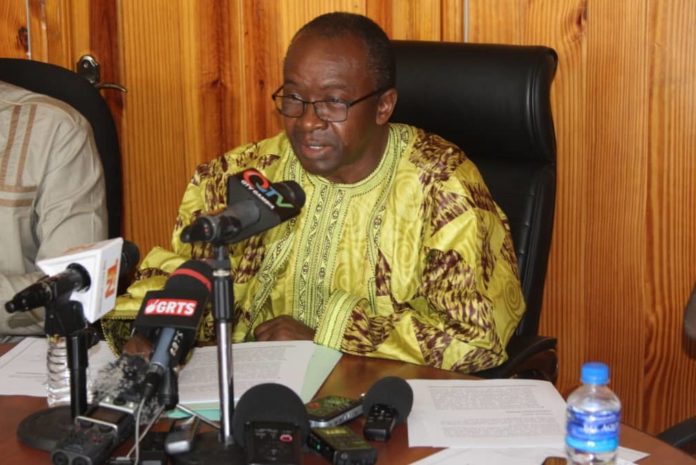By Nelson Manneh
Justice Cherno Sulayman Jallow, the Chairperson of the Constitutional Review Commission (CRC) has disclosed that the Commission has engaged 104 communities in the whole country.
“The public consultations started with 84 (eight-four) communities, but concluded with 104 (one hundred and four) communities country-wide,” he said.
As part of the mandate of the CRC, the Commission had embarked on a series of public consultation from 5th November, 2018 to 26th January, 2019, a period spanning over three months.
Justice Jallow said the public consultation entailed direct interface with Gambian communities around the country to discuss issues related to constitutional reform and to establish a public opinion on matters that Gambians wish to contribute towards the building of a new constitution.
Jallow highlighted that the public consultations involved face to face dialogue with communities, schools and individuals; in addition, face to face dialogue was held in Focused Group Discussions (FGDs) with women, youth and men and the CRC administered questionnaires in all the neighbouring villages around the venues at which public consultations were held.
He said the CRC has engaged 30 schools throughout the country.
“The level of participation and engagement has been extremely high and impressive,” he said.
He emphasised that the consultations would ensure that a new Gambian Constitution is designed and developed upon the basis and spirit of all-inclusiveness, participation and ownership.
Justice Jallow thanked all Gambians who participated actively in the public consultations for their invaluable contributions or simply attended the public consultations to express quiet support and give value to the constitutional review process.
He disclosed that the Commission has received and is processing position papers submitted by Gambians and other stakeholders in hard copies and through the CRC website. He said as of 31st December 2018, the CRC has received 7 religious bodies, 5 educational institutions, 9 government bodies, 17 non-government organizations, 3 inter-government organizations, 51 submissions from individuals and one political party. In addition to these, Justice Jallow said the CRC has received numerous opinions online and has been reviewing opinions expressed through the social media and the print media.
“We value their contributions and assure them that their opinions will be seriously considered alongside the views and opinions expressed by others, including opinions gathered during the public consultations that just ended on 26th January 2019,” he said.
He said the consultation process would also incorporate the views and aspirations of Gambians living in the Diaspora and it will cover some countries in Africa, Europe and some states in the United States of America. He said the Commission will provide a separate platform whereby individuals and communities that feel that their views may not have been adequately represented at the public consultations to seek a special audience with the CRC. He said the process is now open and will continue until the end of February 2019.
He stated that during the public consultations, a number of issues contained in the CRC’s Issues Document were discussed and people gave their views and opinions. He said key among the issues that surfaced were citizenship, fundamental rights and freedoms, elections, local government structures and empowerment, the executive, the need to establish service commissions for health, education, agriculture and the environment, the legislature, representation of women, youth and persons with disabilities, declaration of assets, the use of local languages in the National Assembly, public finance, political party finance, National Youth Service Scheme and security of tenure for the offices of the Auditor General, Governor of the Central Bank of The Gambia, and chief executives of public enterprises.
“A host of pertinent emerging issues were also raised by the communities ranging from issues related to foreign investors in The Gambia, acquisition of land by housing estate agents and its negative effects on communities’ livelihoods and grazing lands for animals, access to health care service, education and other basic services, farmers’ lack of access to markets, women’s ownership of and access to land, and youth unemployment; this is just to mention a few,” he said.
“However, some of the most pertinent issues raised by the Gambian community at large relates to concerns about the governance of the country. It is an understatement to say that Gambians generally have lost faith in government and that is any government,” he said.
He asserted that the consultation process afforded many with a rare opportunity to vent their frustrations at how the government is administered.
“They do not trust the educated class that they seem to view as untrustworthy, greedy, unreliable, and without conscience; one even indicated that he does not trust his educated sons because of how he has seen them amass their wealth. Some amongst them have even called for farmers to lead this country. And what was striking in all of these engagements was the absence of a political partnership. People spoke with knowledge and respect and expressed the hope that the educated class will use their positions to truly develop this country and the rural Gambia,” he detailed.
He revealed that the next steps for the Commission include establishing technical committees, continuous domestic engagements and household survey.
On the challenges, Jallow said the Commission is faced with financial independence. He said the Central Bank is faced with the challenge of issuing cheque books to its customers, including the CRC, due to some internal perennial problems we do not comprehend.
“As this unhelpful arrangement continues, it continues to potentially slow down the progress of our work with challenges for ensuring proper efficiency and effectiveness,” he decried.


















